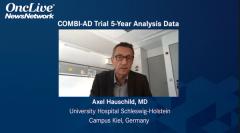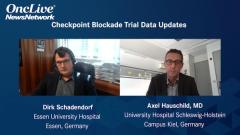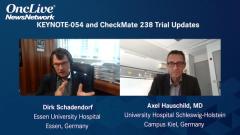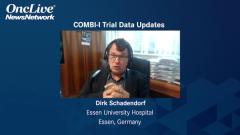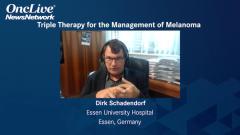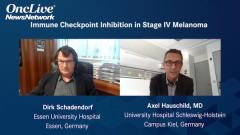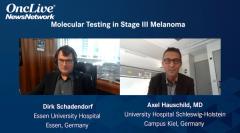
Immune Checkpoint Inhibition in Stage IV Melanoma
Episodes in this series

Transcript:
Axel Hauschild, MD:Dirk, we want to switch to the last question, and this is a question on our personal approach with immune checkpoint inhibition and dabrafenib-trametinib in the adjuvant setting in particular, but also for stage IV and the COVID-19 [coronavirus disease 2019] crisis. Germany has not been as affected as the United States by the crisis, but still it was a matter of debate. Can you summarize what you are doing right now in metastatic melanoma? Eventually it’s the same for the immune checkpoint inhibition in cutaneous squamous cell carcinomas.
Dirk Schadendorf, MD:From what we have seen, regarding COVID-19 infection and cancer patients, we have not seen many patients with skin cancer affected, at least in Germany, and there is not an increased mortality for these patients. On the other hand, one has to keep in mind in the peak season, in March and April, in Germany there was a huge reduction in various measures, including prevention and screening. One has to keep in mind that advanced tumors—including melanomas, squamous cell carcinoma, macrocell, and all that—while we have treatment options available, are much more deadly than obviously COVID-19, so these patients need treatment. That’s the No. 1 statement, and I think we agree on that. The question is, if we have multiple options like in melanoma who are BRAF mutated, is there any preference? To be honest, we have during the pandemic chosen oral drugs in order to not force patients to come to the hospital for the infusions. We have used a lot of telecommunication and digital communication with our patients to manage adverse effects, to stay in touch with the patients, and that worked out quite nicely, to be honest. Right now we are also using nivolumab-ipilimumab as we did before the pandemic in a routine way.
Axel Hauschild, MD:We are doing the same, and we are behaving the same. This is also in concordance with the NCCN [National Comprehensive Cancer Network] Guidelines from the United States, where they were speaking about a variable to dabrafenib-trametinib in the adjuvant setting, but now it’s no longer an issue. The discussion was that it is interesting to prolong the intervals, and at least for nivolumab and pembrolizumab we have 2 options: nivolumab, to give 2 or 4 doses weekly, and pembrolizumab, 3 or 6 weekly. Is this also a consideration in your center and the other German centers to use during the pandemic in order to reduce the number of visits, the longer intervals?
Dirk Schadendorf, MD:Yeah, definitely. To reduce the workload for the staff and also for the patients not to get endangered by traveling to the center, we have taken these aspects into account, discussed with the patients, and used quite frequently.
Axel Hauschild, MD:A kind colleague—I’m not sure if it was you, Dirk—was providing me with a paper published in the Journal of Urology in 2007, in which MEK inhibitors were described to reduce virus load of coronaviruses. And that was from Chinese, all those working in the United States. I was not even aware that the coronavirus disease existed and discussed over there. Do you think there might also be an inhibitory capacity, not only of BRAF and MEK inhibition but eventually of PD-1 antibodies?
Dirk Schadendorf, MD:For the PD-1 antibodies, that’s clear. PD-1 antibodies are being developed for viral diseases as well. They are quite capable. The immune system is quite capable to catch and to control viruses. However, I think that the challenge is the lung toxicity and to discriminate inflammation in the lung caused by checkpoint blockade, especially combined checkpoint blockade, and the virus infection by COVID-19. To be able to discriminate that and to treat that accordingly is a challenge. Now we have more guidance. We know, for example, that steroids—especially in the more inflamed phases of COVID-19—are helping to control the inflammation. That’s what we also use for controlling immune-related adverse effects. Still, I believe it’s some sort of experimental setting, and it depends on the experience of the center and the comorbidities of the patients, which is guiding our way.
Axel Hauschild, MD:I have a last question, Dirk, before you summarize our session. Do you think we will see a renaissance of the good old interferons? Because they were described as antiviral agents in the late 1950s, and now that we have the problem of this virus, are they coming back to the adjuvant setting simply because they might also have a protection against influenza and COVID-19?
Dirk Schadendorf, MD:Simple answer: no. I don’t think that will be an option. We have more effective options to target the immune system. Checkpoint blockade is 1 way, and there are other ways to do that. As you have mentioned, COVID-19 and all the restrictions going with it—interaction in the hospital and social distancing and all that—will probably affect us for quite some time. It will restrict not only our travel time—Axel, you are a frequent traveler—but also the travel of our patients to the center. So we need to think of the toxicity profiles of the drugs we are using, of the comorbidities of our patients, and what can we do to protect our staff and our patients to guide our patients through this pandemic, keeping in mind that adjuvant treatment and treatment in stage IV is potentially lifesaving. It’s possibly endangering a patient’s life much more than the fear of COVID-19. With that, thank you for your lively discussion, my dearest Axel, and I hope you found it interesting and entertaining. See you the next time. Best regards from Germany.
Axel Hauschild, MD: Bye-bye.
Transcript Edited for Clarity


